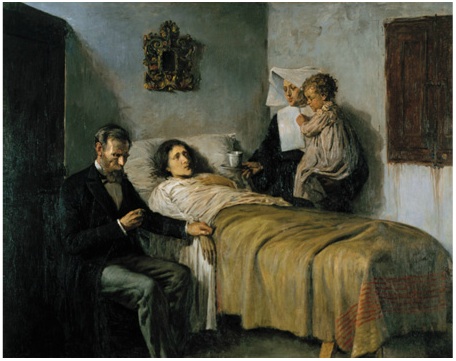5 Lessons I Learned from Viewing 4000 Pieces of Picasso's Art
/Well friends, JC and I returned to the states on Sunday after a little over a week in London and Barcelona. It was an incredible trip that was jam packed with tours, museums and imagining what life was like in the shoes of some pretty influential, awe-inspiring people. Our days in London and Barcelona had us pulling back the curtain on the lives of Winston Churchill, Paul McCartney (and the Beatles), Charles Dickens, William Shakespeare, C.S. Lewis, Pablo Picasso and Antoni Gaudí.
Today I want to share with you some of the lessons that stood out to me as I toured the Museu Picasso de Barcelona. The museum has a permanent collection of over 4000 pieces created by Pablo Picasso. The pieces are organized chronologically so we saw how Picasso's style evolved over the years, step by step. The first section was a collection of paintings Picasso created when he was about 14. The first thing I noticed?
1. You don't become a world class artist without starting with an unusual amount of natural talent.
2. Talent must be cultivated. Picasso started formal artistic training with his father at age 7. He was enrolled at Barcelona's School of Fine Arts at age 13. And he never really stopped learning. In 1900 he moved to Paris, the art capital of Europe. He was influenced by many other artists and continued to grow.
3. Picasso was prolific. Picasso clearly did not just paint when he "felt" like it. While I saw some 4000 of his works at the Picasso Museum in Barcelona, the total number of art works he created in his lifetime has been estimated at 50,000: 1,885 paintings; 1,228 sculptures; 2,880 ceramics, roughly 12,000 drawings, many thousands of prints, and tons of tapestries and rugs.
4. Evolution is integral. Picasso's style greatly evolved from the time of classical realistic paintings in his teens to his blue period (in which he only painted in blue shades for three years) to finally arriving at the cubism he is famous for creating. Change can be scary but it's important to grow.
5."Bad artists copy, good artists steal." -Picasso One of my favorite portions of the collection at the Picasso Museum in Barcelona was a series of 58 paintings Picasso worked on for an entire year in 1957. Picasso went deep analyzing and riffing on the famous painting Las Meninas by Diego Velásquez. Picasso donated the entire collection to the museum--the only complete collection in one place today.
This is what Picasso said about it: "If someone want to copy Las Meninas, entirely in good faith, for example, upon reaching a certain point and if that one was me, I would say..what if you put them a little more to the right or left? I'll try to do it my way, forgetting about Velázquez. The test would surely bring me to modify or change the light because of having changed the position of a character. So, little by little, that would be a detestable Meninas for a traditional painter, but would be my Meninas." -Picasso, 1950
Creativity and contribution may not come from a completely original piece but rather a new take on something older. Maria Popova said it so well: “Creativity is combinatorial: Alive and awake to the world, we amass a collection of cross-disciplinary building blocks — knowledge, memories, bits of information, sparks of inspiration, and other existing ideas — that we then combine and recombine, mostly unconsciously, into something ‘new.’ From this vast and cross-disciplinary mental pool of resources beckons the infrastructure of what we call our ‘own’ ‘original’ ideas.”
I was awash with inspiration walking through the halls of these great museums seeing the work that has far outlasted the lifetimes of the people who brought these great creations to life. I've come back from vacation just a little more determined to leave something useful or inspiring behind one day. They certainly did life on purpose. I want to as well.
Have you ever encountered a performance, piece of art or history that made you want to take action yourself? I'd love to hear about it in the comments.












